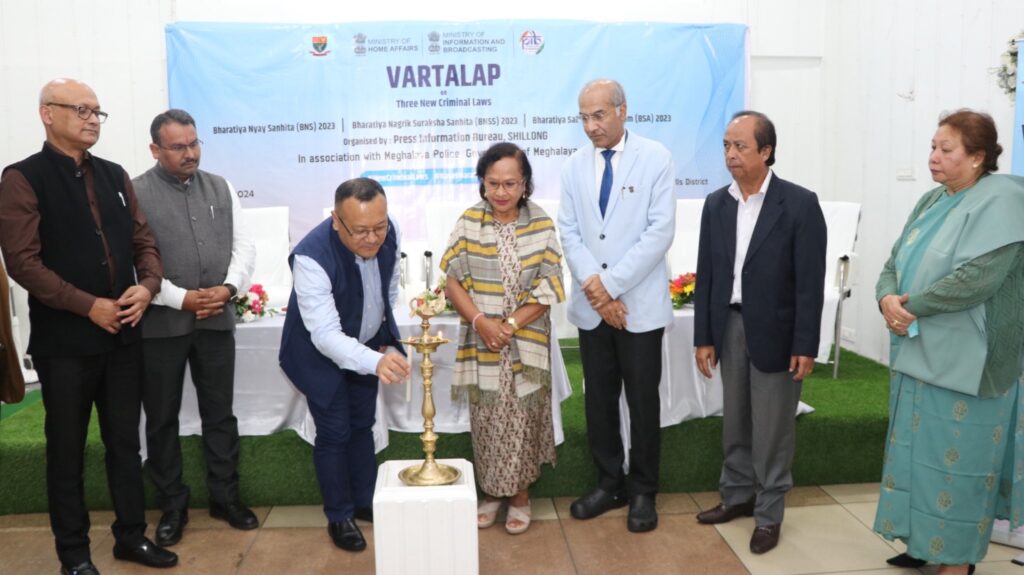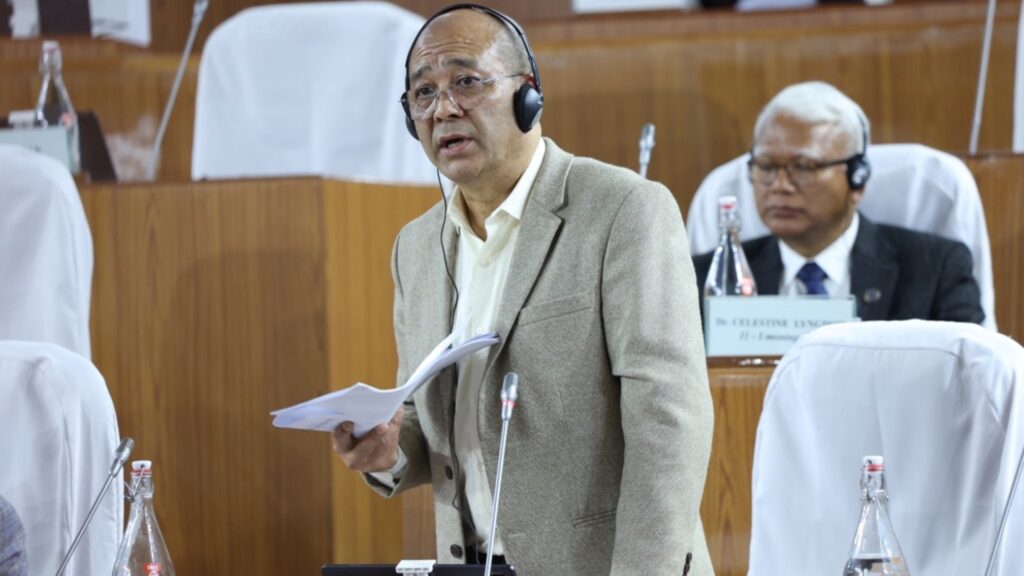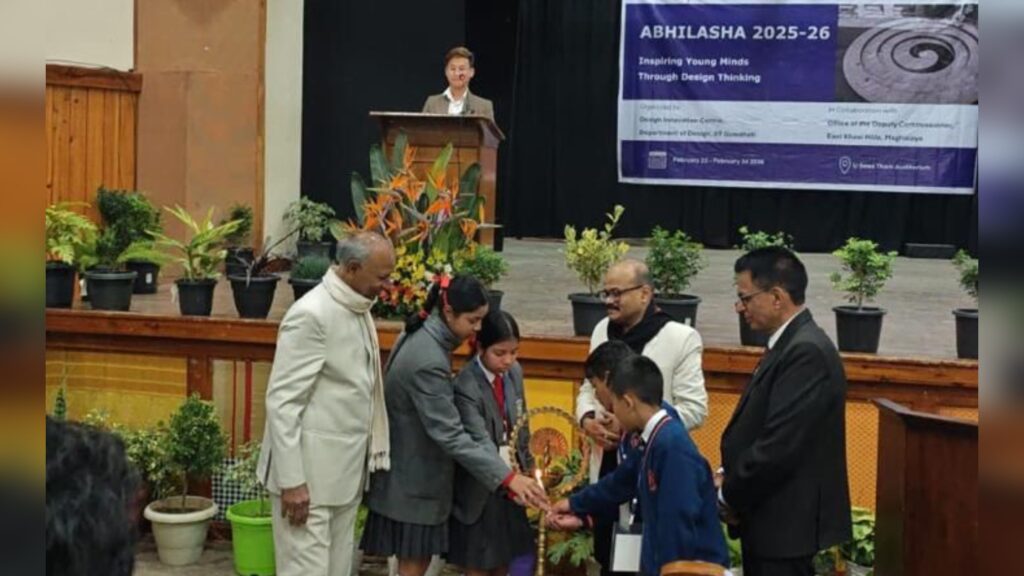Shillong, June 27 : Press Information Bureau, Ministry of Information & Broadcasting, Government of India, Shillong organised Vartalap, a Media Workshop today in association with the Meghalaya Police on the three new Criminal Laws ‘Bharatiya Nyaya Sanhita’ (BNS), ‘Bharatiya Nagarik Suraksha Sanhita’ (BNSS) and ‘Bharatiya Sakshya Adhiniyam’ (BSA) of 2023 in Shillong. These laws are set to come into force on 1st July, 2024.
Davis N R Marak, DIG, Meghalaya, while addressing the mediapersons, said that the implementation of the three new laws is a momentous occasion and Meghalaya Police is fully prepared to implement them. He said that a total of 2561 police personnel in Meghalaya have been trained on the new laws so far. The officers are trained on the applicability of new laws and how they should perceive them while dealing with the crime and cases related to it, he added.
Describing these laws as a shift from an archaic colonial system, he said that these new laws have been designed and are being enacted by the government after considering it expedient and necessary to review the existing criminal laws with an aim to strengthen the law and order.
He said that the new laws represent a new direction for the criminal justice system of the country. The new laws also focus on simplifying legal procedures to make existing laws relevant to contemporary situations and to provide speedy justice to common man, he added. He said that Bharatiya Nyaya Sanhita (BNS), as the name suggests, focuses on Nyaya or Justice and hence the change in name since there is a shift in focus from punishment in the IPC to Justice or Nyaya in the BNS.
Underlining the emphasis on time bound verdicts and the limits on adjournments under the new laws, the DIG said that a citizen-centric criminal procedure has been adopted in the Bharatiya Nagarik Suraksha Sanita 2023 or the BNSS which has replaced the CrPC. He explained how the BNSS mandates a standardized procedure for recording, collecting, transporting and storing forensic evidence.
Marak said that the three laws will focus on justice rather than punishment and are aimed at providing speedy justice. He said, “timelines have been prescribed for time bound investigation, trail and pronouncement of judgements. Citizen-centric approach has been adopted for supply of copies of FIR, including by digital means, summary trails have been made mandatory for petty cases. The accused persons may be examined through electronic means like video conferencing and the Magisterial system has also been streamlined”.
While explaining the Bharatiya Sakshya Adhiniyam, Marak said that the Indian Evidence Act was enacted in 1872 and has been in use with some amendments but the lEA does not address the technological advancements undergone in the country in the last few decades. The new Law i.e., The Bharatiya Sakshya Adhiniyam, 2023 or the BSA provides for evidence to be provided electronically and permit appearance of witnesses, accused persons, experts and victims through electronic means like video conferencing. Other changes have also been brought to incorporate various technological advances, he added.
While concluding he said that the transition from the old criminal laws to the new criminal laws is the need of the hour which makes the Criminal Justice System more citizen friendly, more accessible to the public and more transparent.
During the panel discussion, moderated by Ratul Barua, former News Editor of the Meghalaya Guardian and Communication Manager for the Forest Department of Assam, several key figures contributed their insights. It included Patricia Mukhim, Editor of The Shillong Times, Vivek Syiem, IPS, Assistant Inspector General of Police, Shillong, Khalid Khan, Additional Advocate General, Meghalaya, R L Blah, and Anita Nongkhlaw.
The Editor of The Shillong Times, Patricia Mukhim, while expressing her concern over the low conviction rate in Meghalaya, said that the enactment of the new laws which promises for time bound verdicts will help in delivering timely justice. Furthermore, the role of the media in implementing these laws were also discussed. While appreciating the efforts of PIB Shillong in organising this workshop, she exclaimed that more such workshops will help in percolating the essence of the new laws to the grassroots.
Bipul Das, DSP Crime, East Khasi Hills, and Dr. Ravi Kant Mishra, Associate Professor, Department of Law, NEHU, Shillong, also participated in the deliberation giving insightful introduction to the new criminal laws. Debu Lyngdoh, Joint Secretary, Law Department, Government of Meghalaya underscored the importance of the new laws and how they will be effective in helping Meghalaya’s law enforcement and judicial processes.
The interactive session focused on the three new criminal laws and included questions from representatives of the community, students and teachers from law colleges, journalists, and mediapersons about the state’s readiness, including manpower to implement the amendments. Vivek Syiem emphasised the initial training for staff and also highlighted technological advancements such as E-FIR applications, FIR status checks, and QR codes to streamline police work. Advocate Khalid Khan provided perspectives from the judiciary, while community leaders addressed challenges faced within their communities and praised the new laws for improving public access to online data and creating a more seamless experience for the general public.
The ‘Vartalap’ was organised to sensitize the media in Shillong about the ethos, spirit and intent behind the three new criminal laws. During the workshop, the speakers explained the rationale for the introduction of these laws and highlighted some of the important departures from the Indian Penal Code, the Criminal Procedure Code and the Indian Evidence Act.








